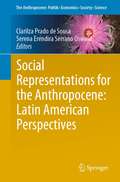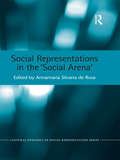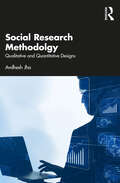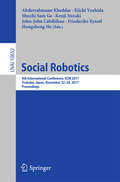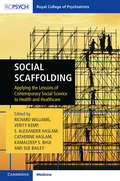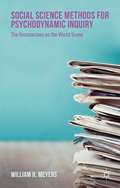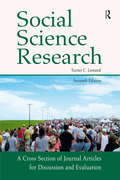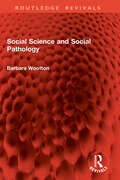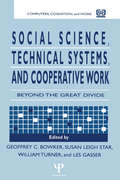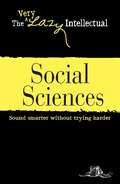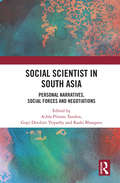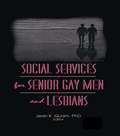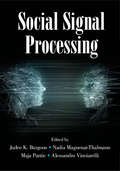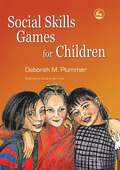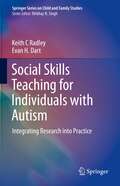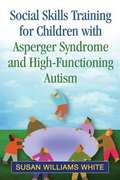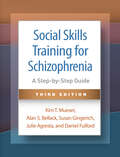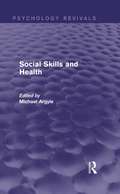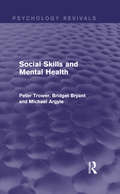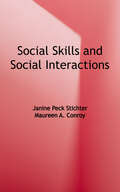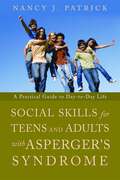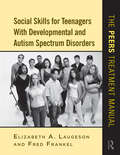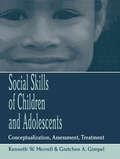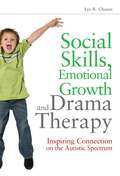- Table View
- List View
Social Representations for the Anthropocene: Latin American Perspectives (The Anthropocene: Politik—Economics—Society—Science #32)
by Serena Eréndira Serrano Oswald Clarilza Prado de SousaThe Anthropocene has become a field of studies in which the influence of human activity on the Earth System and nature is both the main threat and the potential solution. Social Representations Theory has been evolving since the 1960s.It links knowledge and practice in everyday life and is an effective way to deal with systemic crises based on common sense. This book assembles key contributions by Latin American scholars working with social representations in the social sciences that are of conceptual relevance to the study of the Anthropocene and that investigate the societal consequences of complex interrelations between common sense and topics of global relevance, such asthe contradictions of sustainable development, the construction of risks beyond risk-perception, health, negotiation and governance in the field of education, gender equality, the usefulness of longitudinal and systemic ethnography and case studies, and agency and the link between inequality, crises and risk society in the context of COVID-19, presenting theoretical and methodological innovations fromSpanish, Portuguese and Frenchresearchthat have rarely been available in English. • This is the first book to address the relevance of Social Representations Theory for the Anthropocene as a societal era• It presents the multidisciplinary scope of Social Representations• This book covers emerging research contributions in Social Representations Theory from Latin America• This book presents innovative research and commentaries by established researchers in the field• This multidisciplinary book should be in the libraries of many disciplines in the social sciences and humanities
Social Representations in the 'Social Arena' (Cultural Dynamics of Social Representation)
by Silvana de Rosa AnnamariaSocial Representations in the 'Social Arena' presents key theoretical issues and extensive empirical research using different theoretical and methodological approaches to consider the value of social representation theory when social representations are examined in real world contexts. This comprehensive text brings together international experts to explore the relevance of a variety of applications of social representation theory in both institutional and organizational settings, and discusses how social representation theory compares with other constructs of social psychology. Areas covered include: justice leadership health and mental illness intergroup relations identity politics environment and tourism economics. This book will appeal to a range of academic researchers and practitioners from a variety of fields who are concerned with the application of social representation theory to various contexts as a heuristic tool for addressing and understanding relevant societal issues faced with 'social demand'.
Social Research Methodology: Qualitative and Quantitative Designs
by Avdhesh JhaThis book provides unrivalled coverage of both quantitative and qualitative research methods, making it invaluable for anyone embarking on social research. Divided into five parts/sections, it introduces tools, techniques, critical aspects and knowledge of conducting social research, which include a detailed discussion about the basics of social research, social research problem, review of literature, hypothesis, sampling, research design, tools of research, statistics and report writing. The volume helps acquire knowledge, develop an understanding, apply the concepts in social research and curate checklists and rating scales designed to evaluate the statement of a problem, research proposal, hypothesis, different methods of research and writing research reports. It also includes a brief discussion about statistics, the style of reporting and the criteria for evaluating social research. This book will be a helpful reference/text for graduates, postgraduates, doctoral scholars and all those interested in societal development. It would also be useful to students, researchers and teachers of the various social sciences disciplines like psychology, sociology, education, social work and other allied subjects. It would be an invaluable companion to professionals and data scientists working in the field of analytics.
Social Robotics
by Shuzhi Sam Ge Kenji Suzuki John-John Cabibihan Hongsheng He Abderrahmane Kheddar Eiichi Yoshida Friederike EysselThis book constitutes the refereed proceedings of the 4th International Conference on Social Robotics, ICSR 2012, held in Chengdu, China, in October 2012. The 66 revised full papers were carefully reviewed and selected from numerous submissions. The papers are organized in topical sections on affective and cognitive sciences for socially interactive robots, situated interaction and embodiment, robots to assist the elderly and persons with disabilities, social acceptance of robots and their impact to the society, artificial empathy, HRI through non-verbal communication and control, social telepresence robots, embodiments and networks, interaction and collaboration among robots, humans and environment, human augmentation, rehabilitation, and medical robots I and II.
Social Scaffolding: Applying the Lessons of Contemporary Social Science to Health and Healthcare
by Daniel MaughanUsing current societal dilemmas, this book explores how social factors and social identity influence our health and recovery from illness. It includes recent research to present practitioners, researchers, policymakers and students of many disciplines with the material to support them in better harnessing current knowledge of the impact of social factors on health. The contents will influence collaborative working across policy, disciplinary and practice boundaries to design and deliver healthcare services. The book identifies the importance of social connectedness, social support, agency and self and group efficacy in people's health, longevity and resilience after adversity. Core perspectives include the social identity approach and a values framework for taking public health ethics into decision-making, both of which emphasise valuing people and co-productive relationships. Advocating better targeted mental health promotion and integrated interventions, this book strongly argues for a greater emphasis on social factors in evidence-based and cost-effective practice.
Social Science Methods for Psychodynamic Inquiry
by William R. MeyersThis book explains, with case examples, a variety of social science research methods suitable for studying the unconscious components of irrational social and political actions in world affairs, which can be defined as those that are intensely destructive, self-destructive, or extremely bizarre. The book argues that they are driven in part by feelings and fantasies that are outside of conscious awareness. Meyers explores the role of empathy in clinical understanding, as well as the value of exposing assertions to empirical disconfirmation. With a variety of research methods such as survey research, content analysis, and narrative analysis, and case examples such as studies of 'irreal' statements by authoritarian leaders, fabricated newspaper articles and climate change denial, this book sheds light on how to conduct research on psychodynamic matters in a scientifically valid and credible way.
Social Science Research: A Cross Section of Journal Articles for Discussion & Evaluation
by Turner C Lomand• This new edition gives students valuable practice in reading and evaluating research. All major methods of research are illustrated, including qualitative research, content/document analysis, survey research, observational research, experimental research, and program evaluation. • The articles deal with contemporary topics that will hold your students’ attention. • The lines in each article are sequentially numbered. This allows easy reference to specific parts of the articles during classroom discussions. • Factual Questions at the end of each article encourage students to read for methodological and substantive points. • The Answer Key provides answers to the Factual Questions. The line numbers where the answers can be found are included, making the key easy to use. • The Questions for Discussion at the end of each article address broad issues of research design and overall research quality. • Ideal for homework assignments followed by classroom discussions at the next class meeting.
Social Science and Social Pathology (Routledge Revivals)
by Barbara WoottonOriginally published in 1959, this book critically examines, in the light of numerous research, both the relation between unacceptable behaviour and economic and social status and the validity of several popular hypotheses of the 20th Century: that anti-social attitudes are due to lack of maternal affection in infancy, or that problem families produce problem families generation after generation. The author discusses the factors affecting the growth of modern psychiatry and how this shaped attitudes towards anti-social behaviour and conceptions of social work. The final section of the book considers the wider methodological implications.
Social Science, Technical Systems, and Cooperative Work: Beyond the Great Divide
by William Turner Geoffrey C. Bowker Susan Leigh Star Les GasserThis book is the first to directly address the question of how to bridge what has been termed the "great divide" between the approaches of systems developers and those of social scientists to computer supported cooperative work--a question that has been vigorously debated in the systems development literature. Traditionally, developers have been trained in formal methods and oriented to engineering and formal theoretical problems; many social scientists in the CSCW field come from humanistic traditions in which results are reported in a narrative mode. In spite of their differences in style, the two groups have been cooperating more and more in the last decade, as the "people problems" associated with computing become increasingly evident to everyone. The authors have been encouraged to examine, rigorously and in depth, the theoretical basis of CSCW. With contributions from field leaders in the United Kingdom, France, Scandinavia, Mexico, and the United States, this volume offers an exciting overview of the cutting edge of research and theory. It constitutes a solid foundation for the rapidly coalescing field of social informatics. Divided into three parts, this volume covers social theory, design theory, and the sociotechnical system with respect to CSCW. The first set of chapters looks at ways of rethinking basic social categories with the development of distributed collaborative computing technology--concepts of the group, technology, information, user, and text. The next section concentrates more on the lessons that can be learned at the design stage given that one wants to build a CSCW system incorporating these insights--what kind of work does one need to do and how is understanding of design affected? The final part looks at the integration of social and technical in the operation of working sociotechnical systems. Collectively the contributors make the argument that the social and technical are irremediably linked in practice and so the "great divide" not only should be a thing of the past, it should never have existed in the first place.
Social Sciences: Sound smarter without trying harder (The Very Lazy Intellectual)
by Adams MediaDoes studying Freud leave you crying for your mother? Have you had a laissez-faire approach to learning economics? Fear not! The Very Lazy Intellectual: Social Science details the most popular social sciences, including psychology, economics, anthropology, and more. With information on everyone Binet to Boas, and subjects from psychology to archeology, you'll be Renaissance man in no time.
Social Scientist in South Asia: Personal Narratives, Social Forces and Negotiations
by Achla Pritam Tandon Gopi Devdutt Tripathy Rashi BhargavaThis book is a collection of autobiographical narratives by leading social scientists working across South Asia. It explores the linkages between their personal experiences and academic pursuits and analyzes how personal, political, and professional choices shape knowledge production and effect social transformation. The narratives revisit long-standing debates on objectivity, subjectivity, self, and other and attempt to collapse the binaries that have informed the social sciences until now. Highlighting the state of research and pedagogy in the social sciences in the region, the book questions the conventional understanding of the task of the social scientist and, in doing so, blurs the distinction between theory, research, pedagogy, and activism. A unique and compelling contribution, this volume will be indispensable to students and researchers of sociology, anthropology, history, creative writing, education, politics, biography studies, and South Asian studies. It will also be of interest to general readers.
Social Services for Senior Gay Men and Lesbians
by Jean K QuamSocial Services for Senior Gay Men and Lesbians is an important new reference that provides those in the helping professions with practical information on how to work with the older gay and lesbian population. Although older gays and lesbians are the same in many ways as their heterosexual counterparts, they have an extra “layer” of concerns that are unique to their sexual orientation, including “coming out” to family and medical professionals, fear of discrimination, isolation, and loneliness. This new book helps social service providers address these and other concerns of the aging homosexual.Social Services for Senior Gay Men and Lesbians examines the history of homosexuality and how practitioners have developed ways to better serve this population. The book features case studies of topics that face practitioners and their older gay clients, including: housing needs of older gay and lesbian adults group therapy for older gay males long-term care dilemmas for older lesbians counseling an older gay male who is “coming out” staff development for non-gay social service providers historical review of gay and lesbian issuesBecause so little information exists in these and other areas, Social Services for Older Gay Men and Lesbians is an excellent resource for social workers, psychologists, nurses, counselors, and physicians.
Social Signal Processing
by Nadia Magnenat-Thalmann Judee K. Burgoon Alessandro Vinciarelli Maja Pantic"Social Signal Processing is the first book to cover all aspects of the modeling, automated detection, analysis, and synthesis of nonverbal behavior in human-human and human-machine interactions. Authoritative surveys address conceptual foundations, machine analysis and synthesis of social signal processing, and applications. Foundational topics include affect perception and interpersonal coordination in communication; later chapters cover technologies for automatic detection and understanding such as computational paralinguistics and facial expression analysis and for the generation of artificial social signals such as social robots and artificial agents. The final section covers a broad spectrum of applications based on social signal processing in healthcare, deception detection, and digital cities, including detection of developmental diseases and analysis of small groups. Each chapter offers a basic introduction to its topic, accessible to students and other newcomers, and then outlines challenges and future perspectives for the benefit of experienced researchers and practitioners in the field"--
Social Skills Games for Children
by Deborah Plummer Jane Serrurier Jannet WrightFeaturing a wealth of familiar and easy-to-learn games, this practical handbook is designed to foster successful social strategies for children aged 5-12, and will help adults to understand and reflect constructively on children's social skills. The book covers the theory behind the games in accessible language, and includes a broad range of enjoyable activities: active and passive, verbal and non-verbal, and for different sized groups. Deborah Plummer addresses issues that might arise when supporting children with a range of communication differences, including children with learning differences, and offers a variety of cognitive and behavioural strategies to help children to reinforce the skills explored in the games. This is an ideal resource for teachers, parents, carers and all those working to improve the social skills of children.
Social Skills Teaching for Individuals with Autism: Integrating Research into Practice (Springer Series on Child and Family Studies)
by Evan H. Dart Keith C RadleyThis book examines current trends and practices in social skills instruction for individuals with autism spectrum disorder (ASD), focusing on empirical support of current practices and for which populations such practices have been most frequently evaluated (e.g., ages, levels of functioning). It details key practices that may be implemented as social skills teaching strategies as well as the theoretical underpinnings of the teaching strategies, relevant empirical support, and a guide to utilization supported by the empirical evaluations. These guides to utilization are a practical tool for implementation of commonly evaluated social skills teaching strategies. In addition, the book describes limitations of social skills teaching and offers recommendations for future research and intervention strategies that may overcome its current limitations. Key topics featured include:Video modeling and social skills training for individuals with ASD. Behavioral skills training for ASD. Peer-mediated teaching of persons with autism. Social narratives of individuals with ASD. Social Skills Teaching for Individuals with Autism is a must-have resource for researchers, professors, and graduate students as well as clinicians, therapists, and other professionals in clinical child and school psychology, behavioral therapy/rehabilitation, social work, public health, and all interrelated disciplines.
Social Skills Training for Children with Asperger Syndrome and High-Functioning Autism
by Susan WhiteThis practical, research-based guide provides a wealth of tools and strategies for implementing social skills training in school or clinical settings. Numerous case examples illustrate common social difficulties experienced by children with Asperger syndrome and high-functioning autism; the impact on peer relationships, school performance, and behavior; and how social skills training can help. Chapters delve into the nuts and bolts of teaching and reinforcing core skills in classroom, small-group, or individual contexts, emphasizing ways to tailor interventions to each individual's needs. Reproducible forms and worksheets can also be downloaded and printed in a convenient 8 1/2" x 11" size.
Social Skills Training for Psychiatric Patients
by Arnold P. Goldstein Leonard Krasner Sol L. GarfieldThis guidebook has been written for all disciplines in the mental health, counseling, and rehabilitation professions. It will be useful for highly trained psychiatrists, psychologists, and social workers as well as for paraprofessionals who have only a bachelor's degree or less.
Social Skills Training for Schizophrenia: A Step-by-Step Guide
by Susan Gingerich Kim T. Mueser Alan S. Bellack Julie Agresta Daniel FulfordThe authoritative presentation of social skills training (SST)--a highly effective, recovery-oriented intervention for people with serious mental illness--the third edition of this complete manual has been significantly revised with over 60% new material. SST can be implemented by a range of providers in diverse clinical and community settings. In a convenient large-size format, the book is packed with practical tools, including clinical vignettes, dialogues, reproducible curricula (Skill Sheets) for 84 skills, guidance for selecting skills to teach based on participants' needs, and tips for overcoming roadblocks. Purchasers get access to a companion website with downloadable copies of the Skill Sheets as well as online-only resources: 84 Social Skill Handouts for clients and 17 assessment forms and other tools for conducting SST groups. New to This Edition *Chapters on specific populations: SST with young people with high clinical risk or first-episode psychosis, older individuals, and those in residential or inpatient settings. *Chapters on cultural factors in SST; gender, sexual identity, and sexual harassment; and technology-based communication. *Three additional curricular areas--technology-based communication, school, and problem solving--for a total of 26 more skills than the prior edition. *Many new reproducible and downloadable tools.
Social Skills and Health (Psychology Revivals)
by Michael ArgyleThe efficiency of an organization and the well-being of those working within it are often dependent to a large extent on the social skills deployed by certain key personnel. The analysis of these skills and the training of people in their use had reached a stage of considerable sophistication. Originally published in 1981, this volume, edited by the foremost authority in the field, presents a wealth of ideas and information on how best to employ social skills training in health and welfare agencies that are still relevant today. The introduction describes the processes of social interaction in which social skills consist, introduces the social-skill model and shows how social competence is assessed and how the most effective social skills are discovered. Subsequent chapters deal with the social skills required of nurses, doctors, psychotherapists, social workers and those charged with child-rearing. There is a chapter which gives an account of the social skill problems of mental patients and the extent to which social inadequacy is responsible for their other problems. The final chapter discusses the main techniques of social skills training, and reviews their success in the light of follow-up studies. The book will be of historical value to all those concerned with the training and performance of personnel within the health related professions and to those with an academic interest in the psychology of human relations.
Social Skills and Mental Health (Psychology Revivals)
by Peter Trower Michael Argyle Bridget BryantIn the 10 years or so prior to original publication in 1978 new theories and discoveries in the social sciences had given a scientific basis and new impetus to the development of social skills training as a form of therapy. This book explores the progress made with this idea and gives practical guidance for therapists based on several years’ experience with the technique. The book provides an account of the latest ideas at the time, about the analysis of social behaviour – non-verbal communication, social skill, rules, analysis of situations, etc. The different techniques for training and modifying social behaviour – some old, some very new – are described and compared, with detailed accounts. There is a careful critical review of follow-up studies of social skills training and other forms of social therapy on in-patients, out-patients and volunteer subjects. The second part of the book consists of a manual for assessing deficits and difficulties, and for training in ten main areas of social deficiency such as observation, listening, speaking, asserting and planning. A rating scale, questionnaire and user’s booklet of training exercises is included. The book should be of interest, not only to psychiatric professionals – psychiatrists, clinical psychologists, psychiatric nurses, occupational therapists – but to many others, such as social and community workers, teachers, prison officers, and lay people who may be interested in forming self-help groups, either on their own or with professional guidance.
Social Skills and Social Interactions
by Maureen A. Conroy Janine Peck StichterSocial Skills and Social Interactions is written to enhance the quality and quantity of social interactions of individuals with autism spectrum disorder (ASD) and their peers. The text describes social competence and peer-related social behaviors, a multisource functional approach to assessment, and evidence-based practices for fostering peer-related social interactions. This book provides a systematic process for educators to assess, plan for, and support students' social behaviors with peers in the classroom.
Social Skills for Teenagers and Adults with Asperger Syndrome: A Practical Guide to Day-to-Day Life
by Nancy J. PatrickThis resource provides practical strategies for helping teenagers and adults with Asperger Syndrome to navigate social skills, friendships and relationships at home and in the community. The author offers advice and useful strategies for tackling day-to-day problems such as visits to the dentist or the doctor, searching for a job, sorting out personal finances, going on vacation, and dealing with public transport, as well as more intimate topics such as dating and acquiring and maintaining friendships. The chapters are structured around real-life scenarios and the challenges they present, followed by step-by-step solutions and suggestions. A final section provides a set of practical self-help tools, which encourage the reader to note down answers to the questions posed and record personal reflections. This accessible guide will be essential reading for teenagers and adults with Asperger Syndrome and their families, teachers, therapists, counsellors, carers, social and health work professionals.
Social Skills for Teenagers with Developmental and Autism Spectrum Disorders: The PEERS Treatment Manual
by Fred Frankel Elizabeth A. LaugesonThis book is essential reading for any clinician or researcher working with teens with autism spectrum disorders. This parent-assisted intervention for teens is based on a comprehensive, evidence-based, 14-week program at UCLA’s Semel Institute for Neuroscience and Human Behavior, the manualization of the popular UCLA PEERS Program, and the success of the Children’s Friendship Training (Routledge, 2002) manual for children. After reviewing techniques designed to help parents and therapists tailor the manual to the needs of the teens with whom they are working, the text moves on to the individual treatment sessions and strategies for tackling issues such as developing conversational skills, choosing friends, using humor, get-togethers, teasing, bullying, gossiping, and handling disagreements. Each session chapter includes handouts, homework assignments, descriptions of what to expect (and how to handle challenges in delivering the intervention), and customized tips for both parents and therapists.
Social Skills of Children and Adolescents: Conceptualization, Assessment, Treatment
by Kenneth W. Merrell Gretchen GimpelThis scholarly yet highly readable and practical text systematically covers the importance, development, assessment, and treatment of social skills of children and adolescents. Combining scientific rigor with a highly approachable and readable style of writing to create a practical and unique book, this volume provides a comprehensive overview of the increasingly important topic of child and adolescent social skills. A wide variety of tables, figures, and practical step-by-step guides enhance the material presented, making it particularly useful for practitioners while offering an extensive array of recent research and models of interest to researchers. The authors present a solid foundation of scientific knowledge written in a manner accessible to nonscientists and having ample practical implications and examples for educational and clinical practice. The book is divided into two parts--the first features a foundation for conceptualizing and assessing child and adolescent social skills, whereas the second focuses on the arena of intervention. An up-to-date and unique addition to the literature, this volume will be of interest to professionals who work with or study children across several disciplines including school and clinical child psychology, special education, counseling, and social work. Although many books and other professional materials on the social competence of children and adolescents are presently available, the knowledge regarding these social skills is expanding rapidly, and there is a tremendous need to keep it current. This book helps meet this need by not only synthesizing a great deal of recent work in the field, but also by providing new information and evidence that has not yet been published. It also bridges an important gap that sometimes exists between research and practice. For instance, some books on child and adolescent social skills are clearly written for the academician or researcher, and may have little apparent application for the clinician or practitioner. Other materials are written as practical assessment or intervention guides for the clinician/practitioner, yet sometimes lack supporting evidence and rationale. This book is aimed at both arenas.
Social Skills, Emotional Growth and Drama Therapy
by Lee R. ChasenDrama therapy provides valuable opportunities for children on the autism spectrum to interact and connect with others in a fun, supportive environment. The innovative model of drama therapy described in this book is rooted in neuroscience, and designed specifically to develop social, emotional and expressive language skills in children with autism spectrum disorders (ASD). Lee R. Chasen provides an accessible explanation of the theoretical foundations, concepts and techniques that make up the approach, and describes in detail a thirty-session drama therapy program which uses creative and playful tools such as guided play, sociometry, puppetry, role-play, video modeling and improvisation. Scenarios drawn from his own practice provide useful insights into the practicalities of setting up and running such a program, as well as into how children's social, emotional and expressive language skills deepen through their immersion in this unique approach. This book will be of interest to drama and creative arts therapists, as well as teachers, school psychologists, counsellors and other professionals who work with children with autism spectrum disorders.
